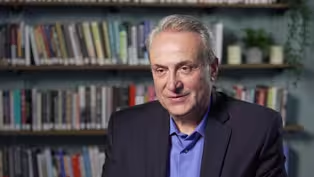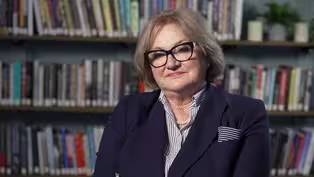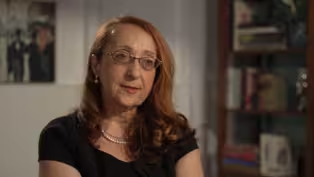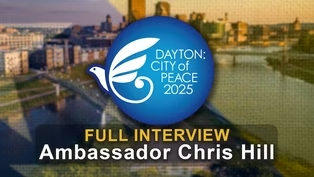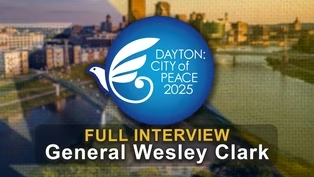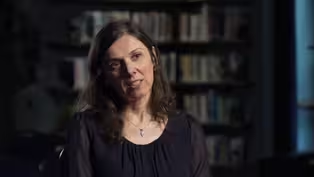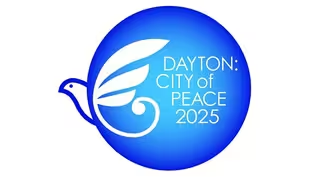
Full Interview: Kati Marton
Clip: Special | 40m 55sVideo has Closed Captions
Interview with Kati Marton, widow of Dayton Peace Accords negotiator Richard Holbrooke.
As part of ThinkTV's Dayton: City of Peace 2025 project, we're marking the 30th anniversary of the Dayton Peace Accords by releasing our full interview with author and journalist Kati Marton. Marton, the widow of Richard Holbrooke, the chief negotiator to the accords, revisits the stakes of that pivotal period, and shares how Holbrooke enlisted her help during the talks at Wright Patterson AFB.
Problems playing video? | Closed Captioning Feedback
Problems playing video? | Closed Captioning Feedback
ThinkTV Originals is a local public television program presented by ThinkTV

Full Interview: Kati Marton
Clip: Special | 40m 55sVideo has Closed Captions
As part of ThinkTV's Dayton: City of Peace 2025 project, we're marking the 30th anniversary of the Dayton Peace Accords by releasing our full interview with author and journalist Kati Marton. Marton, the widow of Richard Holbrooke, the chief negotiator to the accords, revisits the stakes of that pivotal period, and shares how Holbrooke enlisted her help during the talks at Wright Patterson AFB.
Problems playing video? | Closed Captioning Feedback
How to Watch ThinkTV Originals
ThinkTV Originals is available to stream on pbs.org and the free PBS App, available on iPhone, Apple TV, Android TV, Android smartphones, Amazon Fire TV, Amazon Fire Tablet, Roku, Samsung Smart TV, and Vizio.
Providing Support for PBS.org
Learn Moreabout PBS online sponsorship- Journalist and author, Kati Marton is a human rights advocate, who for years has been working to protect the rights of women and girls.
The native born Hungarian had a front row seat at the Peace Talks because she was married to US Diplomat, Richard Holbrooke, who was key in getting the three presidents to negotiate and hammer out the peace accords.
Welcome, Kati Marton.
- Thank you, Ann.
I'm delighted to be with you today.
- Take us back to the Bosnian War.
What was the world thinking?
What were you thinking?
- Well, the reason really that I had that front row seat that you referred to, and, and I have to say that it was more than a front row seat because Richard Holbrooke was the sort of diplomat who used any available tools to hand, and I happened to be to hand, we were newlyweds.
We didn't wanna be a part.
He wanted me at Dayton, and he wanted me around for as much of his negotiation in the Balkans during the war as possible.
And I was also a journalist, as you pointed out, and I was at the same time, the chair of the committee to protect journalists.
So you see, I was wearing multiple hats and made use of all of them.
But in Dayton, I got to know these former war criminals, not even so former, who a week before they arrived to Dayton were basically trying to gouge each other's eyes out.
I mean, they were, they were mortal enemies, and Richard's role was to bring them to the table and to make them end the bloodletting.
300,000 people had been killed during the most savage war since World War II on the European continent.
And, and the, the world, the Europeans and the US kind of stood by and let this happen.
And until President Clinton decided enough was enough and appointed Richard Holbrooke to be the chief negotiator, Richard had a history going back to the Paris Peace Talks that ended the war in Vietnam when he, he was the youngest member of the negotiating team at those peace talks.
And, and so he brought a lot to the table.
And the, the road to Dayton really started that summer when the, the Bosnian Serbs rounded up Muslim boys and men to the forest of Srbrenica and massacred them by the hundreds.
And at that point, president Clinton and the rest of the world decided this bloodletting has got to stop.
And so Richard had the unenviable task of stopping it.
And his first, his, his, his first job was, was to get to Sarajevo.
And that ended tragically with the death of his three top negotiators, whose they were, they were trying to get to Sarajevo because Serbs wouldn't guarantee their safety flying in.
So they had to drive on what was called Europe's most dangerous road into Sarajevo.
And the armored personnel carrier that, that carried his three top negotiators rolled down that hill, the hill on Mount Igman.
And, and Richard and his military aide, General Wesley Clark, who was also in Dayton with us, scrambled down that hill to try to extricate the men from the burning armored personnel carriers.
Of course, very, very sadly, they, they, they were all, they were all dead.
Richard, that same day, brought those, the coffins with his colleagues back to Washington.
And I had received a call from Secretary of Defense, William Perry that morning, saying, I'm gonna send a plane for you.
I was with my kids on vacation.
This was August in Long Island, and indeed, true to his word, he did send a plane.
And I was there at Andrew's Air Force base outside Washington to greet Richard, who looked 10 years older than the last time I saw him.
He'd spent the night with his knees against the coffins of his comrades.
And after a brief meeting with the president and the National Security Council and the memorial for, for the fallen diplomats, he got right back on that plane, more determined than ever to end this savage war.
- Which goes to my next question, if I may.
So, yes.
Why was he so driven to end the Bosnian war?
- Well, he was not only a diplomat, but he was a humanitarian.
And, and he was appalled that the world had stood by and, and let these, these terrible events take place really on live TV.
And, and people were, were acting as, as though they were helpless.
And for Richard, it was the first major test of NATO, which had been founded at the end of World War ii, as you know, to just to prevent this kind of a conflict.
So in fact, this was NATO's first big challenge, and it was the Americans who, who ultimately rose to the challenge by summoning all parties to this kind of three ring circus of a negotiation at Wright Patterson Airbase, which I was privileged to be not only a witness of, but sometime participant in.
- And what made Richard the man to do it?
And what were his tactics?
- Well, he was, he, he was known to be a, a black belt bureaucrat.
He'd been in and out of government.
He was in every Democratic government, but he was not a, for him foreign policy stopped at the water's edge.
He, he would've done the same if, if, if, if President Bush had asked him to do that.
For him, diplomacy was not a partisan affair.
So he, he had, he had the, the credentials that went back to back to his days as a very young diplomat in Vietnam.
He spent five years in Vietnam, and he, he had, he had a reputation.
But really the success of these talks was by no means for ordained.
In fact, Richard, because we, we spoke, even when we weren't together, we spoke every day.
He really didn't have much hope for these talks because, because these, these ethnic hostilities went so far back and had been unleashed.
The war was started by the Serbian President Slobodan Milosevic.
And once you unleash the dogs of war, they're very hard to to to leash again.
So Richard had a, a very precise plan, and he often gave the world the impression that he was acting spontaneously and, you know, having temper tantrums.
But I can tell you, Ann, that those temper tantrums were rehearsed.
We would, the night before we, we, we would predict what the next day's talks would be like, and who would be, who would be the, the most recalcitrant of the, of the three we're talking about Bosnian Muslims, Bosnian Serbs, Croatians, and, and, and the Serbs.
It was the Serbs who started the war.
But, but by now, everybody was, was involved and, and you know, wars have a way of getting out of control.
And he, he had a very precise plan, which was partly based on his experience in Vietnam.
But what really the negative lesson of Vietnam was that the US should not get mired in a regional conflict.
And just to jump forward a bit, if I may, and in the 30 years now since the, the war ended, the war in Bosnia ended in Dayton, Ohio, not a single casualty has resulted, not a single combat casualty has resulted.
And even though we had the largest deployment of US forces there at the outset, no longer, so Richard, who unfortunately is no longer with us, would very proud of that record.
He would not be so proud of the fact that the international community, US included, have sort of taken a backseat in enforcing the accords that were hammered out in the most agonizing circumstance behind the high wire fence of Wright Patterson Airbase.
- Yeah.
Thank you for that.
So what was your take on the shuttle negotiations while they were underway in the Balkans?
And, and Richard wrote about the ups and the downs, and obviously would've shared that with you as well.
And what did you see as some of the hardest parts in that effort?
- Every inch of it was hard.
I mean, nobody's, none of the, none of the warring parties wanted peace because war was all they knew, and they were fighting over every inch of territory.
But Richard used not only his, his diplomatic tools, which by the way included the use threatening with the use of force.
So it wasn't all peace talk, it was, we've got other, we've got other means too.
We have B-52s, we have tomahawk missiles, but first let's talk before we unleash those on you.
So it was a very carefully calibrated use of, of carrots and sticks.
And also, this is a cautionary word because at the moment we're in, we're engaged in, in, in a terrible war in, in Ukraine and another terrible one in, in, in Gaza.
And so this, this is a really an object lesson in, in diplomacy to end wars, because all wars have to end eventually, and they have to end at the negotiating table.
And, and Dayton has become like the model for how to end a war, and not only with a ceasefire, because Dayton did more than, than achieve a ceasefire, but to enable the country to, to restart.
You now have a multi-ethnic, more or less democratic country of, of Bosnia and Serbia and Croatia.
It's imperfect, but the guns are silent.
And the city of Sarajevo, which when I was there during the war, was, was a nightmare of, of sandbags and shattered buildings and rubble.
And you would not have believed that it could rebuild the way it has.
So peace was given a chance, and again, I emphasize that it was in Dayton, Ohio.
And why Dayton as opposed to Paris or Geneva or Vienna, the more favored places for high level diplomatic talks, which believe me, the parties to this talk would've way preferred because they were quite bored at Dayton, which was part of Richard Holbrooke's plan was to make them, was to bore them so that they'll settle down to business and not go out shopping.
By the way, if I may, if I may interject, - Go ahead.
Because I think I know what you're gonna say, and I was gonna ask you about something about that, but go ahead.
- Yeah, we did go shopping because Miloseovic insisted on on going to the Army Navy supply store on the base, and asked me to go with him as, as his, as his interpreter and guide.
And he snapped up the craziest stuff.
I mean, sweatshirts and parkas and you know, everything with Wright Patterson logo, those were gonna be his Christmas presents for his family.
So, but, but it wa there was no Gucci, which would've been his preference.
- Yeah, it wasn't Fifth Avenue, like, and that's what he, it was not.
Right.
Okay.
- Right, right, right.
So that was, that was part of it.
But, but more seriously, and the reason that Richard chose Dayton was because he wanted this to be an American event.
He wanted a America to demonstrate that we, okay, everybody knows we know how to make war.
He wanted the world to see that we also know how to make peace and in the American heartland.
So Dayton struck him as, as the most perfect place for that.
And the, the isolation of Wright Patterson was also perfect and perfect for another reason.
And that was its distance from Washington, D.C.
which meant that Holbrooke could control the environment and there were drop-ins from high level visitors, the Secretary of State, the Secretary of Defense, the National Security Advisor, they would come and go.
But basically President Clinton, in his wisdom, gave Richard the mandate to negotiate as best he could and end to this war.
And, and the details left to, to Holbrooke to work out, which showed great confidence, which is what a negotiator needs.
- But going into it, what about yourself?
Were you optimistic that isolating these three presidents was actually going to work and result in the peace accords?
- It didn't look good.
It didn't look good.
These guys, the opening night dinner, Richard seated me between, between Slobodan Milosevic and, and Alija Izetbegovic, the Serb and, and the Bosnian Muslim.
And he said, Kati, your assignment is to make them talk to each other.
And as I said, we were newlyweds, I was, you know, I really wanted to please my husband and, and not fail my first test.
And so we were well into the second course, and these two guys were not even acknowledging each other.
They were looking off in other directions.
And, and I, I was, I was sweating.
And you know, Richard, who was at the other end of the, of the hangar, this huge hangar with, by the way, a B-52 floating right over us at the table.
Again, a reminder, okay, you guys we're talking now, but we got other weapons too.
We got the, that, that thing over your head, so not so subtle reminder.
Anyway, three quarters of the way through, through this remarkable dinner, which, which featured a sort of Glen Miller style band, and, you know, it was kind of all American Andrew's Sisters singing songs from World War II.
Completely surreal.
I said, in frustration, just kind of leaning back and about to throw up my hands.
So how did this war start anyway, you know, feigning ignorance, because I knew exactly how it started.
And at that point, they both jumped in with their own version, and they both admitted that they didn't expect it to go so long, which was so astonishing that, and, and such a reminder that people never expect wars to turn as, as brutal as they inevitably do.
And at that point, when, when President Milosevic started calling President Izetbegovic, Alijam by his first name, and, and Izetbegovic answered Milosevic with "Slobo," I knew I scored a major victory.
And I kind of looked over to make sure my new husband saw what I was doing.
And, and he was pretty pleased.
So that was, that was my first little diplomatic coup.
But that, you know, in the, in those, in those two weeks, it was such a roller coaster ride because these, these were temperamental, warlords unaccustomed to compromise and, and with blood on their hands and, and knew that some of them likely would end up in, in, in the Hague in a cell as they did.
- Why did it take this particular group of American negotiators, including your husband, to really make a difference?
- Well, let me, let me just, let me just say that, that, that Richard was really the, the, the force behind this.
He had a very loyal team, a wonderful team, but, but he, he, he was the one with the, with the, the creativity and the imagination and the, and the force of personality.
He was a big guy.
He was unafraid to, to use power, which for these guys was, was essential.
You couldn't have a quiet, smaller personality bringing these guys to heal.
He was fearless and, and he, he was, he was practicing all-in diplomacy.
This was not, this was no longer shuttle diplomacy.
This was, this wasn't somebody, you know, helicoptering in and then going out in and out.
The way we often see nowadays, this was, they were literally locked up.
And whenever one of them would, would, would, would threaten to, to storm out or to end the talks, Richard would say, then we will resume the war.
And in other words, you have no other choice.
But, but many times or a bunch of times, I thought that the talks would, would end in failure.
And in fact, there was one, I, I believe it was, it was toward the end, I believe, on November 20th when, when it really did look like the talks were failing.
Because in this instance it was president is Izetbegovic who just seemed incapable of saying yes to anything.
He just, you know, this was a, a man who had no trust left in, in any of his adversaries and, and, and just didn't wanna, didn't wanna sign the, on the dotted line.
And, and at that point they, they were all, now picture this, we're, we're in extremely close quarters.
It wasn't called the proximity talks for nothing.
There was real proximity.
The everybody had the, had similar quarters.
These, this was the, the barracks that were used by visiting officers.
And, and each nation had exactly identical, very modest barracks.
And the, the corridor separating the rooms was, was about this, this wide.
We were, Richard and I shared a room across from the, the so-called map room, which consisted of a computerized map where at night didn't get any sleep during those weeks at night, the guys, the, our team would, would come in and pour over the maps.
And once, once the, once Milosevic discovered that there was this joystick that you could manipulate and fly over this computer map of Bosnia and, and, and, and see every tree in every village, he was absolutely fascinated.
It was like a video game.
And so that became, that became a, a feature of of our lives in, in, in the barracks.
- Yeah, well we asked General Clark about that, and he was talking about that map.
Yeah.
- Yes, yes.
Well, - I wanna ask you, so here's another time.
You played diplomat, you saw Milosevic outside in a snowy parking lot.
Yes.
And you led him to the conference room.
So what was the mission in having civilians like yourself, interact on the base?
- Well, as I, as I said earlier, Anne Richard believed in using whatever tools he had to hand.
And I think he trusted me.
I had a history in, in that region.
I'm Hungarian originally.
And, and I could talk to them about what life was like under communism, which I often did.
And when, whenever one of them would, would, would act up more than normal, Richard would ask me to take him for a walk in the, in the lovely scenic parking lot, the rectangle framed by the barracks.
And we, we did a lot of walking in that parking lot.
And Richard always said, we'll make them talk about their dreams for their grandchildren since I'm a mother.
Well, let me tell you something, Anne, these warlords were uninterested in their grandchildren or in the future.
They were interested in only one thing, power holding onto power, not letting go.
It was such a lesson for me in, it was, it was a, a real, it was kind of shattering to discover how little feeling these leaders have for their own people.
So I struck out in those conversations in the, in the snowy parking lot, but on, on, on this occasion that you mentioned Richard and his team were, were sitting in our room, which had taken on the, the air of a college freshman dorm because everybody was in and out.
And, you know, that was not exactly a decorous backdrop.
And I was hanging back while Richard was preparing his team for failure.
He just couldn't, couldn't get Milosevic and Izetbegovito agree.
I don't wanna bore you with the details of what was the snag, but it had to do with Bro a town forever tattooed to my brain because I had heard Bro so much.
Anyway, the Bro Corridor was, was, was the, the snag.
And at that point, and they were all, you know, it caught up in, in the gloom of the moment.
And I looked up and I, I see Milosevic out, it was snowing out in the courtyard.
And I just instinctively grabbed my coat and ran out and, and grabbed Milosevic.
And obviously he was hanging out there because he had something to say.
So I literally pulled him in to our room and, and I said, I said, Richard, I, I think President Milosevic has something to say.
And at that point, Milosevic said, all right, I will give up whatever it was.
And at that point Izetbegovi I remember Warren Christopher, Secretary of State, Warren Christopher was also there.
Izetbegoviwho was so reluctant 'cause he was the naysayer, said, well, it's an unjust peace, but my people need peace.
And at that point, Richard whispered, Richard shoved the, the, the, the paper in front of the guys to sign before they changed their minds.
And then he leaned over to the, the Secretary of State and said, let's get the hell out of here.
Like two thieves in the night, Holbrooke and, and Warren Christopher bolted from the room before they, they changed their minds, which, which they might well have.
So that was my, my little, little contribution to world, to world peace.
- Yeah, that was a good one.
Well, let's go back just to Dayton.
And when you got there, describe the welcoming nature of the people in Dayton and what stood out to you?
- Oh, well, that, that was so moving that, that we really felt like we had the support of the town.
And almost every day there would be a delegation from Dayton and, and school children would come and light candles and bring art, which we then posted in the sort of hangout place was Packy's Sports Bar.
The support of the town was enormously uplifting for, for everybody involved.
And, and we really felt like this is everybody's in this, everybody is is invested in ending this war.
It's not, it's not just a bunch of diplomats who, who are working day and night.
It's it, you know, the town, which to us represented the best of America really.
- I know you started talking about this in the beginning, but would you consider Dayton a success and do you feel that the Accords provided a sustainable peace or did they freeze certain conflicts in place?
- Well, it ended a war, it ended the most brutal war since World War II, I suppose, until Ukraine.
You know, it's, it's awful to make comparisons because wars are all brutal.
But, but, but certainly the, the Balkan War was, was a, a testing of, of the West and of what is NATO for, if not to stop such a war?
And, and it really kind of certified American leadership because it was America that took charge of the transatlantic relationship.
This was a European war after all.
But, but we ended it because certainly Richard Holbrooke felt that, that the Western alliance had to hang together.
That, that we were, we were absolutely mutually intertwined and interdependent and that we, we couldn't, we, the United States of America couldn't call on others to be, to, to, to, to be good democrats and humanitarians if we ourselves were not willing to go out to, to sacrifice for, for the, the price of peace.
And, and we demonstrated that.
And I think, I think it's one of the proudest chapters in, in American history, frankly.
And the fact that we don't talk about it much anymore means that it's, it's, it's not a, it, it, it's, it's no longer a crisis.
It's no longer a, a, a burning crisis of which there are many.
It's Richard always felt that the, that that it would be in the enforcement and the implementation of the accords that the success of, of the peace lay.
And, and that has been less than, less than what he would've hoped because the West has kind of moved, moved on to other other crises.
And those, those, those ethnic, those ethnic hatreds and hostilities have not, have, not vanished, but the killing stopped and then, and that has enabled it, it's now a generation, a generation to, to grow up in, in peaceful circumstances and to hopefully forge, forge better lives as, as good as good citizens as opposed to warring, warring killers of their neighbors, which is what Milosevic inflamed his people to be.
Kill them before they kill you.
And it's, you know, the power, the power of a dictator who had total control of the media is, is an object lesson for us.
- You know, some people say that the Dayton Peace Accords were never meant to be permanent and maybe there should be like a Dayton 2.
What are your thoughts on that?
- That was certainly Richard's view, because you can't have a peace treaty that's also a constitution for a new country.
And that's what Dayton is.
And it's held, it's, it's held up since 1995 as that.
I mean, there is peace and, and there are three countries there.
And, but you know, there's the, now now Putin's Russia is, is is trying to stir up trouble with, with the Serbs in, in, in Belgrade because they, you know, they share, they share orthodox faith and, and, and, and there's Slav countries.
And we, we really, we really need to stay engaged because this was, as I said before, and this was our, our really a a a proud moment for us.
And it would be a shame to, to let it crumble because of our, because we're distracted or indifferent.
Richard Holbrooke always felt that, that the United States was a, was a great enough country that it had the attention span to deal with more than one crisis at a time.
And the, the, the world has not gotten more peaceful since then.
And I think he would, he would be, well, not so happy with, with our disengagement from our European allies.
He, he considered the United States to be, to be basically a European power and with responsibilities for the, we, we, after all laid all the, all the architecture for the post-war Europe, you know, we created NATO that was, that was our construction.
- So today there's an award in your husband's name and it's given as part of the Literary Peace Prize.
What does that mean to you and why is it fitting that Dayton is the origin for these types of recognitions around peace?
- Well, that award means the world to me, that award is, is is become really kind of the high, high point of my, of every fall when I, when I come to Dayton and I now have a very good friends there.
And the, and the town is very familiar to me, and I always go to Wright Patterson base and I always pay a call on Packy Sports Bar and recall those days.
And it, I am, I am so grateful to Dayton for, for keeping this, this memory alive.
Not only because it's partly my husband's memory, but also because it's something, it's something for, for Dayton and indeed for America to be, to really embrace and be proud of.
And I have to say personally that those days behind the high barbed wire were the most exciting and exhilarating of my life because I felt like I was given a chance to play my hand at, for, for history.
I mean, how often do we get that chance?
And, and, and also to impress my new husband.
- Well, you did a good job.
So you're a world travel journalist and author in and out of war zones.
Can you speak to the role that local towns and communities can have with regard to supporting or sustaining peace abroad?
- Well, I think it, you know, everything is local politics and everything else is, is local.
And, you know, a a source of sadness for me is, is that local, local newspapers have died and local press has been so weakened and that means that that, you know, a a a handful of, of people far away from Dayton and other, other communities and towns in the US are, are sending them their version of events as opposed to covering what's going on there.
And I don't think that we are as polarized a nation as our media, particularly social media, would have us believe.
That is not my experience.
I do not experience those, those violent differences in my travels.
You know, we, we we're still all Americans and we have, we have common, common values and common interests and, and, and I think that Dayton has a, a really important lesson to teach the rest of the country in, in, in what America can and should stand for.
And it's, it's more than telling other people how to, how to behave.
It's behaving with, with great, both humanity and, and, and determination.
We, that's, we we're, we live on a really small planet and, and we can't retreat from that.
And those, those were lessons that I really learned in the Balkans and in Dayton that we're all, we're all in this together, so we might as well learn to get along.
- Yeah.
And just maybe to ask it a different way, staying on the notion of promoting peace abroad from the local level, then what advice would you give to any community member with regards to carrying that torch forward?
- Well, you know, we all, we all have our, our networks.
We all have our, our, our our friends associates and, and communities.
And I, I think it's really important stay informed and not take others' opinions as, as as sacred, but, but do a little digging on our own.
And you know, I'm, I'm, my background is in I'm, I'm I now an author working on my 11th book for my sins.
But I I, my background is in journalism.
My husband was be, before Richard, I was married to, to Peter Jennings, who was a great journalist.
And both my parents were journalists.
So that is kind of in my bloodstream.
And I know that journalists play a really significant role and are professional and are brave and don't stay at home observing and, and writing their opinions.
But go to the field as, as my parents did.
My parents were, were brave journalists in, in, in, in Hungary when I was a child.
And they were jailed.
I didn't see my father for two years because they, they were working for the American wire services and they didn't follow the party line.
The party line was in those days, dictated from Moscow.
Hungary was occupied by the Soviets in during the Cold War in my childhood.
And, and my parents stick stuck to their values and they were pro-American and they were arrested, jailed, convicted, a spies, which they were not convicted as CIA agents.
And, you know, so I was a political orphan for a, for a spell.
And that's probably why I became a journalist because I really do believe that the press has an enormously important role to play the responsible press.
And that we can't, we can't let we, you know, we, we, we, we, we can't let people with lots of opinions and very little actual knowledge to, to shape our, our opinions.
That's really dangerous.
- So finally, the anniversary of the Dayton Accords will be marked throughout the year, starting this spring with the NATO parliamentary assembly, but also in the fall when the historical anniversary takes place in November.
Do you have any final takeaways about the significance of the accords all these years later and why is marking these anniversaries important in your view?
- I think it's terribly important to mark this anniversary.
This was really America at her best.
It was America engaged in the world.
America not as a giant war machine, but America as a force for good, for peace.
But it was America, the strong and America, the, the big power, the responsible not just for the security of its own country, but for the, the western alliance.
And it was NATO's first test.
And thanks to American leadership and partly thanks to the singular abilities of, of one diplomat, namely Richard Holbrooke.
It, it really made history and it really demonstrated a couple of things.
One is that America is still the indispensable nation.
The Europeans couldn't end this war.
And two, the power of a, a, a single human, human agency, that one determined obviously capable, intelligent actor can really bend history.
I mean, that's what I observed, that's what I observed in the, in, in, in Richard's shuttle diplomacy.
And, and, and then in, in Dayton that one, one man could have been a woman.
One man can, can change history.
You've gotta be supremely determined, tireless and, and you've got to have the, the support of, of your government.
Obviously he, he couldn't do that as a free agent, but he did have the government's confidence in him.
And, and I, I I I think that the Clinton administration considers it, its proudest diplomatic achievement.
It should - Kadi Marton, thank you for personalizing history for us.
- Oh, well thank you so much.
It's been a pleasure to talk to you.
Thank you.
And thank you for remembering the Dayton Accords.
Video has Closed Captions
Clip: Special | 5m 54s | Adnan, born in Bosnia and Herzegovina, survived the Bosnian War, before moving to the US. (5m 54s)
Video has Closed Captions
Clip: Special | 6m 27s | Azra, a journalist from Sarajevo, started a successful culinary business in Dayton. (6m 27s)
Video has Closed Captions
Clip: Special | 5m 58s | Dr. Alma, a pediatrician born in Sarajevo, tells her story during the Bosnian War. (5m 58s)
Full Interview: Ambassador Christopher Hill
Video has Closed Captions
Clip: Special | 36m 58s | Amb. Christopher Hill interview, marking the 30th anniversary of Dayton Peace Accords. (36m 58s)
Full Interview: General Wesley Clark
Video has Closed Captions
Clip: Special | 33m 17s | Interview with retired Gen. Wesley Clark on ending the Bosnian War. (33m 17s)
Video has Closed Captions
Clip: Special | 5m 42s | Meet Irena, an educator whose journey began in Konjic, Bosnia and Herzegovina. (5m 42s)
Dayton: City of Peace 2025 Preview
Video has Closed Captions
Preview: Special | 30s | A new ThinkTV-produced honoring the 30th anniversary of the Dayton Peace Accords. (30s)
Providing Support for PBS.org
Learn Moreabout PBS online sponsorshipSupport for PBS provided by:
ThinkTV Originals is a local public television program presented by ThinkTV
